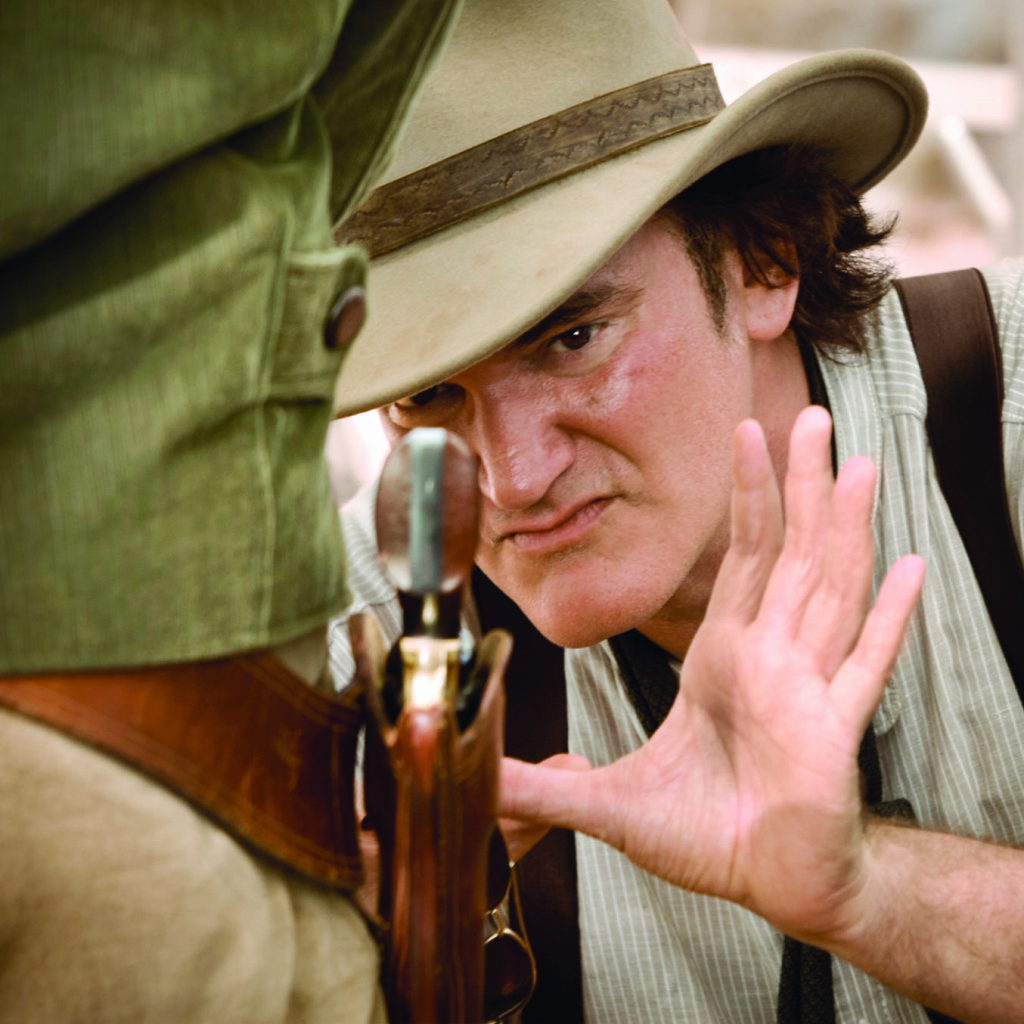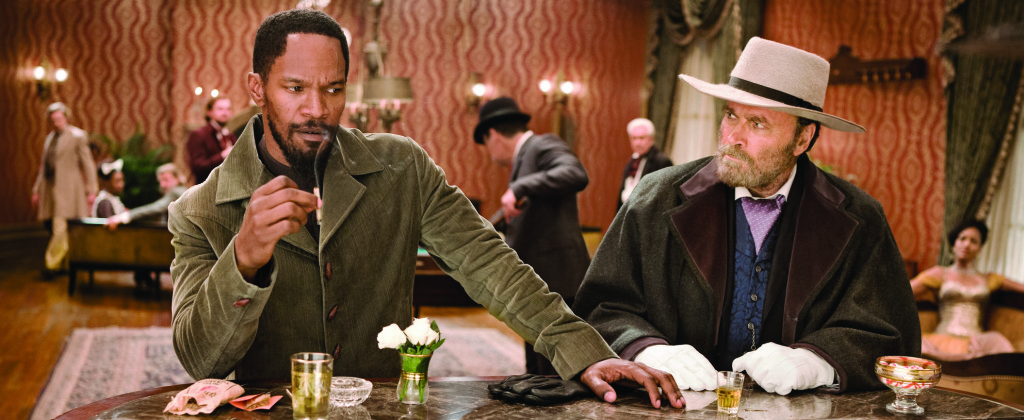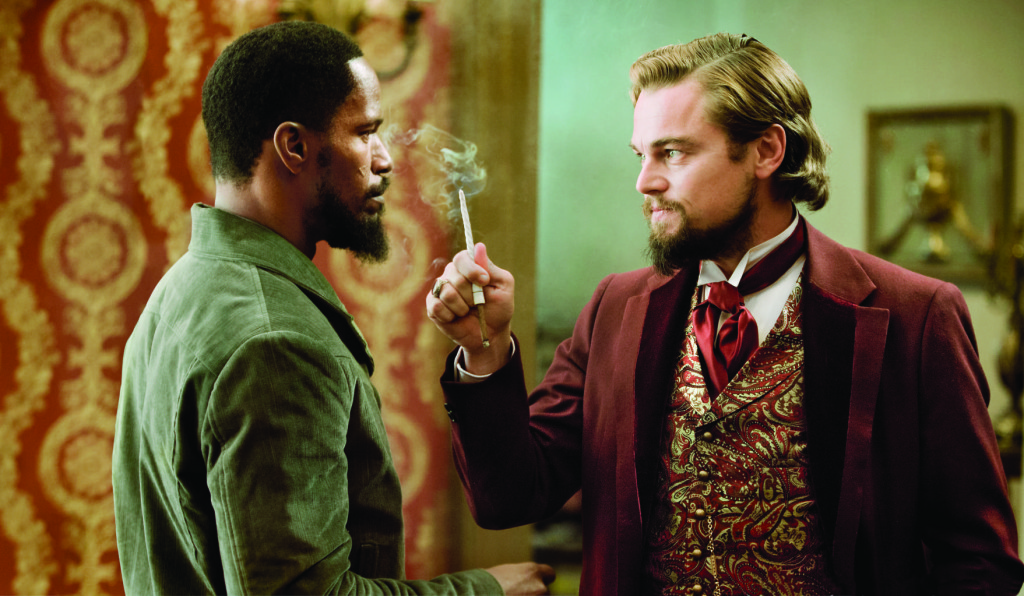Spaghetti western à la Quentin Tarantino: Put Jamie Foxx, Leonardo DiCaprio, Samuel L. Jackson, Christoph Waltz, Walton Goggins, Don Johnson, Kerry Washington, and Jonah Hill in a surreal slavery revenge love story. Add sharp dialogue, aesthetic violence, and twisted humor. Season with a spicy soundtrack. Serve steaming hot — or stone cold.
As Jamie Foxx explains while introducing himself to a stranger in a saloon in Quentin Tarantino’s new movie, Django Unchained, “The ‘d’ is silent.” But nothing else — especially the buzz — about this high-style spaghetti western is.
There’s the kind of hype that surrounds every blockbuster movie, and then there’s the frenzied anticipation that precedes the release of a new Tarantino movie. Soundonsight.org puts the Christmas Day opening of the award-winning director’s upcoming Django Unchained on par with the biggest holiday present ever: “With December comes Christmas, but more importantly, we also get the latest film by director Quentin Tarantino.”
While it’s not the second coming, it is something of a gift to humanity. To the director’s fans, who are worldwide and legion. To the actors, whose bios shine with the credit. To the Hollywood canon, which has embraced Tarantino’s other quirky masterpieces (including Inglourious Basterds, Kill Bill volumes 1 and 2, Jackie Brown, Pulp Fiction, and Reservoir Dogs). Even to Tarantino, who has always wanted to do a western.
But of course Quentin Tarantino wasn’t going to write and direct any old western. He went west by way of Italy.
Spaghetti western might not be the first thing that comes to mind when you think Tarantino, but along with kung fu and “grindhouse,” his stylistic influences have long included the subgenre of westerns that came out in the mid-1960s from Italian directors such as Sergio Leone and Sergio Corbucci. “Since spaghetti westerns have always been my favorite,” Tarantino said at Comic-Con 2012, “I thought the way to [develop] the germ of the story of a slave who becomes a bounty hunter and hunts white men would be to do it in the Sergio Leone vein with cool music and surrealistic violence.”

The original Django — director Sergio Corbucci’s ultraviolent 1966 film in which the drifter Django conceals a machine gun in a coffin, which he drags from his horse on his quest to avenge his wife’s murder — spawned a cottage industry of supposed sequels. Among the dozens to date, Tarantino’s stands out. Part spaghetti homage to Corbucci and Leone, it has all the hallmarks that have made Tarantino himself such a standout filmmaker, from “aesthetic” violence and whip-smart dialogue to off-the-chain humor and a hip soundtrack (this one includes “The Big Payback” by James Brown and “Ain’t No Grave” by Johnny Cash) — all fleshing out the bones of a sticky plot.
In the antebellum South, two years before the start of the Civil War, slave Django (Foxx) strikes a bargain with the wealthy dentist turned bounty hunter Dr. King Schultz (Christoph Waltz) who has bought him: He will help him hunt down the murderous Brittle brothers (his previous owners) in exchange for his freedom. But Django is focused on one goal: finding the beautiful Broomhilda (Kerry Washington), the wife he lost to the slave trade several years earlier. Twisted plantation owner Calvin Candie (Leonardo DiCaprio) presides with extreme villainy over his infamous slave plantation, Candyland, where he enslaves Broomhilda and entertains guests by pitting slaves against each other in murderous death matches. Ultimately the unlikely pair of Django and Schultz infiltrate the property to exact revenge and attempt a daring rescue of Broomhilda.

The plot alone — not to mention a particularly brutal scene in which Broomhilda is whipped by plantation overseers — suggests you would do well not to make the mistake of thinking this is family fare. At least heed what DiCaprio’s nefarious character, sporting a bushy goatee and rotten teeth to especially creepy effect, says with a seeming wink to the audience: “Adult supervision is required.”
Tarantino’s films make stunning use of violence, and they certainly never lack style — or substance. Django Unchained is no exception. Albeit in the trappings of a spaghetti western, the film takes a tough look at slavery in the South, but with enough humor at the right (or wrong) cathartic moments that the audience can’t help but laugh at things that aren’t funny and dissipate the tension.
On the man’s-inhumanity-to-man front, there’s DiCaprio’s vicious inhabiting of the role of Candie, a performance so impressive that other actors went to the set just to see him work, and entertainment pundits are already predicting an Oscar. Far from a preening handsome-guy stereotype, DiCaprio dug deep for his despicable inner bad guy. Foxx, who plays the title role, was bowled over.
“First of all, he’s 6-foot-2,” Foxx told E! News Online. “He comes in there with all the good looks, you know, he’s on the tabloids with the models and everybody’s thinking, Is he going to be that guy?” Far from it. “He is absolutely his character. It makes you go back to your hotel room and really get yourself together because you know you have to be tight.”
How tight? Foxx would have you consider a scene in which DiCaprio’s Candie finds out who Django and his bounty hunter partner are. “He’s angry with us and slams his hand on the table every take,” Foxx also told E! News Online. “Every take is hard. I’m like, ‘Wow.’ And one take, somehow the shot glass slid to where his hand is supposed to be, [and he] slams his hand on the table and breaks the shot glass. It goes through his hand. There’s blood. And he’s still going. And I’m like a little girl, I’ve got my hands up.” [In the interview Foxx affects a girly voice.] “ ‘He’s so courageous! He’s an Avenger!’ ... People came up, gave him a standing ovation, if that’s any indication of how he is. He was amazing.”

Walton Goggins seconds that. Costar with Timothy Olyphant on FX’s modern gunslinging hit Justified, Goggins plays Billy Crash, the chief overseer on Candyland and Candie’s fight trainer. (The role of the trainer initially was to go to Kevin Costner, then Kurt Russell, and was reportedly merged with another role and given to Goggins.) A fan of DiCaprio’s ever since a young Leo starred in This Boy’s Life almost 20 years ago, Goggins remembers watching the now-38-year-old actor’s movies slack-jawed. So when he had the opportunity to work with DiCaprio “in this real intimate way, it was a dream come true for me.”
Goggins, who plays the charismatic criminal Boyd Crowder to Olyphant’s bad-boy boy scout of a deputy U.S. Marshal Raylan Givens on Justified, knows a bad guy when he sees one. “For the big plantation owners of the time, I see this era as one of perversion,” he says. “These plantations are thousands and thousands of acres, and there is a great line in the movie during a caravan ride out to Candyland when Schultz asks Candie if they are now riding on his property. Calvin responds with, ‘You’ve been riding on my plantation the entire time.’ With this extreme amount of wealth comes great boredom, and in this world that Quentin has created, Calvin finds his entertainment in having his slaves fight other plantation slaves; Mandingos is what he calls them. [Goggins’ character] Billy is a specialist in training these men.” (Mandingo, by the way, is a nod to the 1975 film of the same name that starred James Mason as a slave owner in the 1840s who trains one of his slaves to be a bare-knuckle fighter.)
Goggins found DiCaprio remarkably simpatico. “Leonardo and I had this really nice repartee,” he says. “I knew what he was going to say before he said it; and he knew what my response was going to be before I said it.” Beyond that connection, there was the importance of the serious storytelling. “What’s hanging in the balance is men’s lives,” Goggins says. “What Quentin, Leonardo, and I have been able to do is create good enough conversation for the audience to realize we are talking about complex and real people.”
Among those complex and real people looms the almost mythological character of Django. A decidedly urban cowboy, Foxx landed the part after early press had it that the role was originally to go variously to Will Smith and Idris Elba, among others. Now that it’s Foxx in that short green Django jacket, it’s hard to picture anyone else so effectively pulling off what is sure to become an iconic performance in a racially charged movie.
When he met with Tarantino about the role, Foxx told Entertainment Tonight, he didn’t really talk about the script, which he already figured would win an Oscar, but rather told him about “the things I went through growing up — it sort of parallels the character.”
Foxx had plenty to draw on, some benign and some not. As a kid in Terrell, Texas, he was schooled watching westerns on television. His favorite was Bonanza, and he especially loved Little Joe. He’d spin plastic guns, and, as fate would have it, would even wear a Little Joe green jacket. And he rode. “My family has a black rodeo in Texas,” Foxx also told Entertainment Tonight. “We didn’t bull ride or anything like that, but ... we rode horses. So I get a horse about five years ago. So [when the movie trainer] was like, ‘I gotta teach you to ride a horse.’ I was like, ‘I got a horse.’ I said, ‘Is it OK if I practice on mine?’ ”
Now living the Hollywood movie-star life, Foxx remains a horse lover and is known for sharing his equine enthusiasm with colleagues (when Robert Downey Jr. turned 45 in 2010, Foxx gave him a mare for his Malibu ranch). On his avocado ranch in Westlake Village, California, Foxx keeps a couple of horses. His favorite, a beautiful chestnut quarter horse mare named Cheetah, is the one he wanted to practice on. She ended up being good enough to land a part in the movie.
Despite Cheetah’s lack of acting experience, Foxx convinced Tarantino that she could play Django’s horse, Tony. And after a spooky start, horse and rider were able to do their own equine stunts. “My horse and I had basically the same [story] arc,” Foxx said at an interview panel at Comic-Con. “Me starting off as this troubled, number-six slave in the chain gang, and she was a little nervous when they pulled up the silks. She would spook ... and the handler would grab the rein and say, ‘Do me a favor and let go of the rein, and just let her find her bearings.’ So first she would spook, and I would make sure everybody was out of the way. I’d ride her ... until she settled.” By the end of filming, Cheetah was so comfortable that she was doing stunts like a three-turn spin, stopping on a dime, and throwing up her front legs.
Riding his own horse and having her perform so well proved “magical”; less magical but equally effective for getting into character was recalling some harsh experiences from his early years in Texas, stories that Foxx shared with Tarantino and that he has since shared with media. In an interview with Movie Fanatic and Iamrogue.com at Comic-Con, Foxx told the story of how the grandmother who raised him encouraged him to learn to play piano so he could “ ‘go across the other side of the tracks and make some money. The other side of the track is where all the white folks live.’ ”
As a teenager, Foxx once landed a job playing at a Christmas party at a house out in the country. Unable to drive himself, he had a friend take him. “The guy opens the door and says, ‘What’s going on here?’ I say, ‘Well, I’m here to play for your Christmas party. What’s the problem?’ ‘Why are two of you here at the same time?’ I said, ‘Well, I don’t have a license. He drove me. Is there a problem?’ He says, ‘Yeah, I can’t have two [N-word] in my house at the same time. Now, you figure it out.’ ” This, Foxx pointed out, happened in 1984.
“I taught Quentin this word, it’s called furniture — they were doing racial jokes as I was playing. My grandmother said when you’re playing in those situations like that, you’re furniture.” For the Django Unchained role, Foxx knew he could channel that experience and others like it. “What you’re writing in this script,” he told Tarantino, “I’m not knee-jerking, because that happened.”
The insult, the anger, the thirst for vengeance — one imagines Foxx channeled it all into what he has called “the truest depiction of slavery [on screen], in terms of how tough and brutal it was.”
But even more than the truth of the depiction, Foxx thinks it’s the humanity of the love story that will resonate with audiences. “We deal with the political, but [Django]’s not trying to cure slavery,” he told the Los Angeles Times’ movie blog 24 Frames. “He just wants to ride into the sunset with his woman.”
The end result? A true western hero in an epic love story. Now where can we get that Little Joe jacket?
From the January 2013 issue. Read our November/December 2015 cover story profile of Kurt Russell, starring in Tarantino’s next western, The Hateful Eight.












